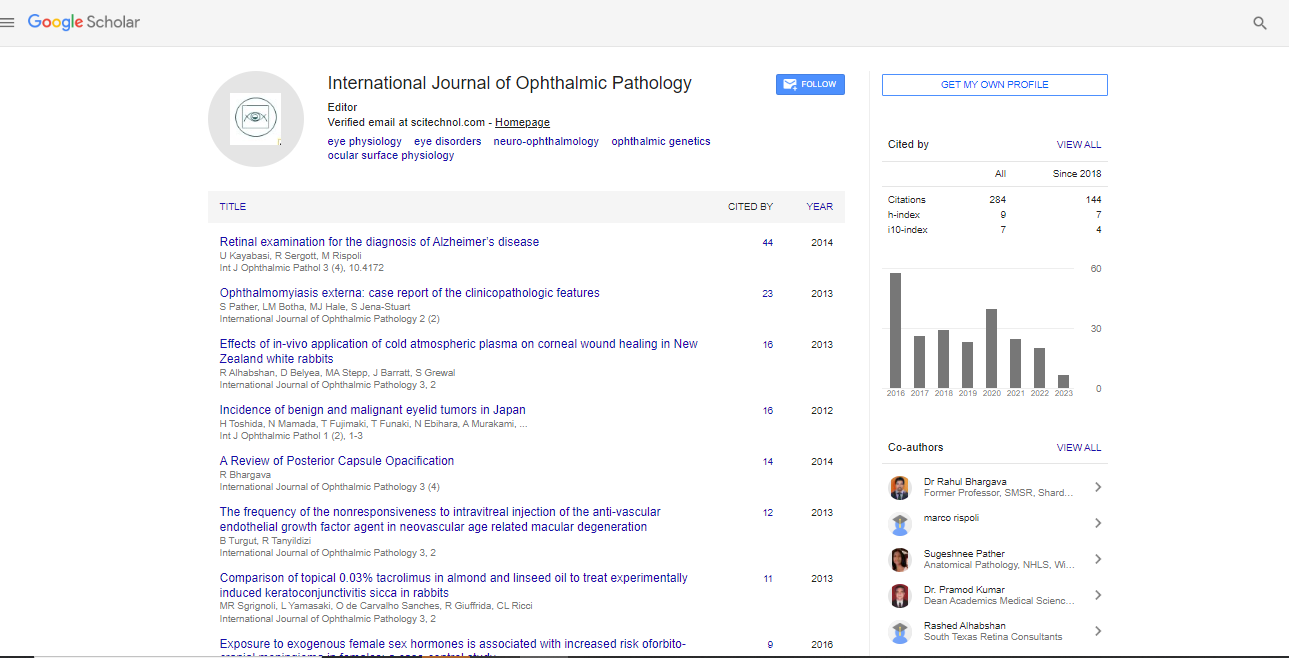Short Communication, Int J Ophthalmic Vol: 10 Issue: 2
Retinal Detachment, Diagnosing, Treatment and Risk factors
Kondala Saisree*
Department of Pharmacy, Andhra University, Visakhapatnam, India
*Corresponding Author: Kondala Saisree
Department of Pharmacy, Andhra University, Visakhapatnam, India
E-mail: saisreekondala.0102@gmail.com
Received: April 09, 2021 Accepted: April 23, 2021 Published: April 30, 2021
Citation: Kondala S, 2021 Retinal Detachment, Diagnosing, Treatment and Risk factors. Int J Ophthalmic Pathol, 10:4. (277)
Abstract
The retina is a light-sensitive membrane situated at the rear of the eye. At the point when light goes through your eye, the focal point zeros in a picture on your retina. The retina changes the picture over to signals that it ships off your mind through the optic nerve. The retina works with the cornea, focal point, and different pieces of your eye and cerebrum to deliver ordinary vision. Retinal separation happens when the retina isolates from the rear of your eye. This causes loss of vision that can be incomplete or complete, contingent upon the amount of the retina is separated. At the point when your retina becomes isolates, its cells might be truly denied of oxygen.
Keywords: Retinal Detachment, Ophthamology
Introduction
The retina is a light-sensitive membrane situated at the rear of the eye. At the point when light goes through your eye, the focal point zeros in a picture on your retina. The retina changes the picture over to signals that it ships off your mind through the optic nerve. The retina works with the cornea, focal point, and different pieces of your eye and cerebrum to deliver ordinary vision. Retinal separation happens when the retina isolates from the rear of your eye. This causes loss of vision that can be incomplete or complete, contingent upon the amount of the retina is separated. At the point when your retina becomes isolates, its cells might be truly denied of oxygen. Retinal separation is a health related crisis. Summon your PCP right on the off chance that you endure any abrupt vision changes. There's a danger of lasting vision misfortune if retinal separation is left untreated or if treatment is postponed.
Symptoms of Retinal Detachment
There's no pain related with retinal detachment, yet there are normally indications before your retina gets detached. Essential manifestations include:
• Blurred vision • Partial vision misfortune, which causes it to appear as though a window ornament has been pulled across your field of vision, with a dull shadowing impact
• Sudden glimmers of light that seem when looking aside
• Suddenly seeing numerous floaters, which are little pieces of flotsam and jetsam that show up as dark bits or strings skimming before your eye
Who is at risk for retinal detachment?
Risk factors for retinal detachment include:
• Posterior vitreous detachment, which is common in older adults
• Extreme nearsightedness, which causes more strain on the eye
• A family history of retinal detachment blue, inexperienced trauma to your eye
• Being over 50 years’ old
• Prior history of retinal detachment purpose.
• Complications from cataract removal surgery
• Diabetes mellitus
Diagnosis of retinal detachment
To diagnose retinal detachment, your specialist will go thorough eye exam. They’ll check:
• Your vision
• Your eye pressure
• The physical appearance of your eye
• Your ability to see colors
You might also test the ability of your retina to send impulses to your brain. They may check the blood flow throughout your eye and specifically in your retina.
Conclusion
In general, it is extremely unlikely to forestall retinal detachment. In any case, you can find ways to stay away from retinal separation that outcomes from a physical issue by wearing defensive eyewear when playing sports or utilizing devices. In the event that you have diabetes, control your glucose and see your PCP routinely. Get yearly eye tests, particularly on the off chance that you have chances for retinal separation. It's imperative to know the side effects of retinal separation. Perceiving when you may have a retinal issue and looking for clinical consideration quickly can save your vision.
 Spanish
Spanish  Chinese
Chinese  Russian
Russian  German
German  French
French  Japanese
Japanese  Portuguese
Portuguese  Hindi
Hindi 